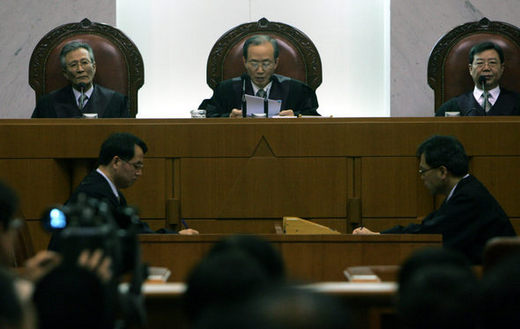 |
Starting in January of 2005, the Presidential Committee on Judicial Reform were created under the President's authority to promote judiciary reform measures. The committee were composed of experts from the legal world as well as representatives of civil society and academia. Until January 16 of this year, an invitational debate forum met 46 times, and public hearings were held in seven stages. In total, 110 committee hearings were held, with 346 judges, public prosecutors, lawyers and academics making their presence known at these functions. In May of last year, Presidential Committee on Judiciary Reform Han Seung-heon met with Minister of Justice Kim Seung-gyu at midnight to reach a compromise after a strong opposition emerged in regards to a proposal to reform the [Criminal Suit Act] by increasing the importance of public trials. However, since their introduction to the Assembly, the essential reform laws such as the "Law School Act" are facing strong headwinds, and only 6 of the 26 laws, including the Crime Victim's Protection Act have been passed. Since last year, the "Law School Act" has been reformed through a series of six sessions of deliberation held under the gavel of legislators Jo Bae-suk, Hwang U-yeo, Lee Ju-ho, and Ju Ho-yeong. On April 17, the governing and opposition party members in the Law Inspection Subcommittee of the Committee of Education reached an agreement on revising the law. However, with the bills passage within reach, the GNP decided to link it to another bill, thus putting a halt to its progress. "Many problems in the current bill have been exposed, and thus there is a need for further discussion," said Kwon Chul-hyun, head of the National Assembly's Committee of Education. "After the session of the National Assembly ends On December 8, and after legislators inspect the failure of the law school system in Japan, we will hold a public hearing in January and then hold further discussions." As this is the equivalent of forgetting the heated discussions that took place in the bill's formation and returning to the starting point, there is some doubt in regards to the will of the Committee of Education to pass the legislation. The results of a Hankyoreh survey of legislators on the Committee of Education found that the majority does not oppose the introduction of a law school system. However, lawyer and legislator Ju Ho-yeong stated his strong opposition. "Even if the governing party says they will revise the Private School Law," he said, "a law school system is unacceptable." The Private School Law, which proponents say in its current manifestation renders the fiscal activities of privately-run schools more transparent, is the target of revision by the opposition Grand National Party. The ruling Uri Party was behind an earlier revision, and they say it should stay as it is. In a GNP member workshop held on August 31, lawyer and legislator Ahn Sang-soo, chairman of the Legislation and Judiciary Committee, said "because the judicial reform law was made by the Presidential Committee on Judiciary Reform, it infringes on the lawmaking power of this body." "America is reconsidering the law school system, and Japan's system failed," he asserted, calling the judicial reforms "out of the question." One legislator of the Uri Party said "how to pass these acts in question is still in discussion among the party leadership. However we are as a loss as to how to overcome the opposition presented by some legislators who once served as lawyers." The "Law School Act" was originally intended to take effect beginning in 2008, but due to its slow progress has been pushed back a year. Now, the possibility for its passage seems quite uncertain, and those students who were planning on attending university law schools will suffer as a result. According to the documents presented to the National Assembly by the Subdivision for Education Human Resources, the amount of money that has been invested by some 40 universities for law school facilities is estimated at over 200 billion Won. The People's Alliance for a Democratic Judiciary, established by civil society groups and the Democratic Legal Studies Association, announced on the 27th of October after a 3,000 kilometer tour of the country that "lawyers and those from the judicial world are rejecting the people's judicial reforms…. In November, we will struggle on behalf of judicial reform." Park Gun-yong of the Center for Judiciary at the People's Solidarity for Participatory Democracy said "the debate on judicial reform has continued for 10 years now, yet there are still legislators who claim that more discussion is necessary. I am concerned that they are representing the entrenched interests of the legal world." Please direct questions or comments to englishhani@hani.co.kr





